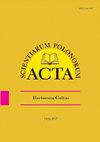侵染SCORZONERA hispanica L.真菌的生物多样性用生物刺激剂培育
IF 0.7
4区 农林科学
Q4 HORTICULTURE
引用次数: 1
摘要
生物刺激剂对土壤环境友好,能有效提高植物生长和产量。实地和实验室研究的目的是确定生物刺激剂对Scorzonera hispania L.植物生长和健康状况的影响。实地试验在波兰东南部的Haplic Luvisol进行。生物刺激剂是根据制造商的建议使用的。此外,将生物刺激剂Asahi SL(活性成分:硝基水杨酸盐和硝基酚类)、Beta Chikol(a.s.–壳聚糖)和Bio Algeen S90(海藻节叶藻提取物)应用于scorzonera cv.´´Duplex´的播前追肥。为了进行比较,使用了杀菌剂Zaprawa Nasienna T 75 DS/WS(a.s.–tiulam 75%)。未经处理的种子作为对照。此外,还测定了在这种蔬菜根部定植的土传真菌的生物多样性。在三个生长季节测定了scorzonera植物的幼苗数量和健康状况。在研究的每一年,对根上有坏死症状的scorzonera幼苗和Scorzona收获后获得的受感染根进行实验室真菌学分析。试验表明,施用生物刺激剂后,尤其是β-赤霉素后,scorzonera幼苗的出苗和健康状况明显优于对照。Asahi SL和Beta Chikol在限制对scorzonera植物致病的真菌发生方面比Bio Algeen S90更有效。焦斑病根最常被链格孢、Alternaria alternata、立枯丝核菌、核盘菌和镰刀菌定植。尤其是尖孢镰刀菌。总之,Asahi SL、Beta Chikol和Bio Algeen S90可以推荐作为有效的生物刺激剂用于黄颡鱼的田间栽培。本文章由计算机程序翻译,如有差异,请以英文原文为准。
BIODIVERSITY OF FUNGI COLONIZING SCORZONERA (Scorzonera hispanica L.) CULTIVATED WITH THE USE OF BIOSTIMULANTS
Biostimulants are friendly to the soil environment and can effectively improve the plant growth and yielding. The aim of field and laboratory studies was to establish the effect of biostimulants on the growth and on the health status of Scorzonera hispanica L. plants. The field experiment was carried out in south-eastern Poland on Haplic Luvisol. The biostimulants were applied according to the manufacturers’ recommendations. Moreover, the biostimulants Asahi SL (active components: nitroguaiacolate and nitrophenolates), Beta-Chikol (a.s. – chitosan) and Bio-Algeen S90 (extract from seaweed Ascophyllum nodosum) were applied for the pre-sowing seed dressing of scorzonera cv. ´´Duplex´´. For comparison, the fungicide Zaprawa Nasienna T 75 DS/WS (a.s. – tiuram 75%) was used. Untreated seeds served as control. Moreover, the biodiversity of soil-borne fungi colonizing the roots of this vegetable was determined. The number of seedlings and the health status of scorzonera plants were determined during three growing seasons. In each year of the study, both scorzonera seedlings with necrosis symptoms on the roots and the infected roots obtained after scorzonera harvest were subjected to laboratory mycological analysis. The experiments showed that, the emergence and health status of scorzonera seedlings after the application of biostimulants, especially after Beta-Chikol, were significantly better than in the control. Asahi SL and Beta-Chikol were more effective than Bio-Algeen S90 in limiting the occurrence of fungi pathogenic towards scorzonera plants. Diseased scorzonera roots were most frequently colonized by Alternaria scorzonerae, Alternaria alternata, Rhizoctonia solani, Sclerotinia sclerotiorum and Fusarium spp., especially by Fusarium oxysporum. In conclusion, Asahi SL, Beta-Chikol and Bio-Algeen S90 can be recommended as effective biostimulants in field cultivation of Scorzonera hispanica.
求助全文
通过发布文献求助,成功后即可免费获取论文全文。
去求助
来源期刊
CiteScore
1.30
自引率
14.30%
发文量
61
审稿时长
4-8 weeks
期刊介绍:
In Acta Scientiarum Polonorum Hortorum Cultus we publish original research papers and review articles containing new and significant information on broad aspects of horticulture and related disciplines. The papers are published in English only, in six issues yearly.

 求助内容:
求助内容: 应助结果提醒方式:
应助结果提醒方式:


